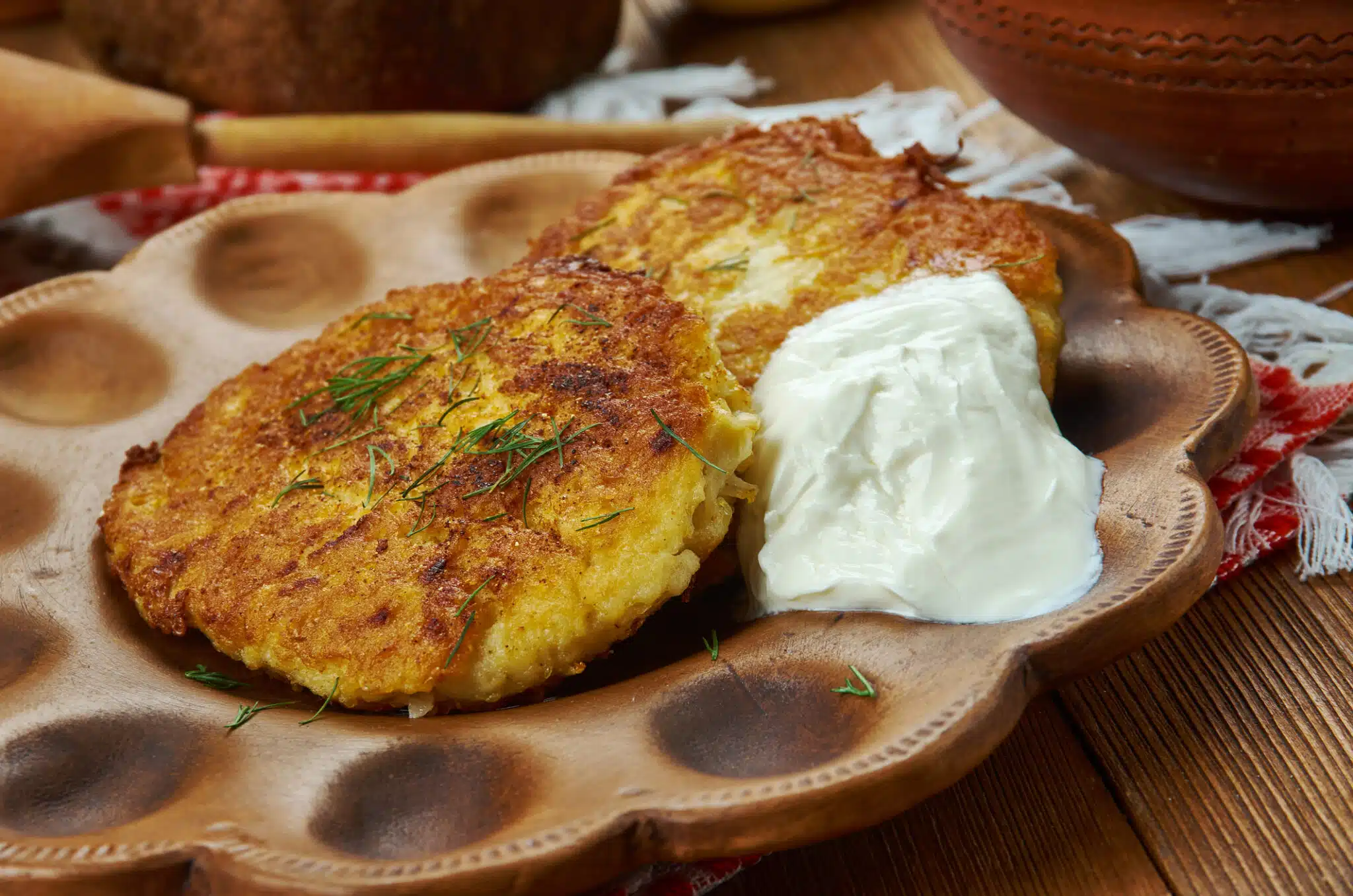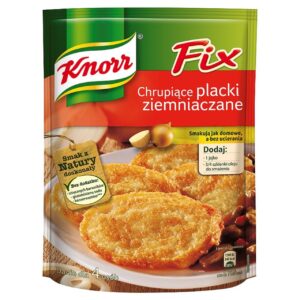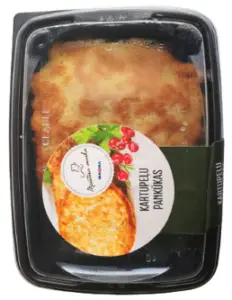Potato pancakes dominate coffee shop menus in Riga, Latvia—and for good reason! Meticulously prepared using grated potatoes, eggs, and flour, these pancakes are crisped to a brilliant golden hue, reaching a level of perfection that rivals the shining sun itself.
The mouthwatering allure of this delightful dish is recognized worldwide. Following their inception in Eastern Europe, potato pancakes have become beloved by numerous cultures, including Germans, Austrians, Russians, Poles, Bulgarians, Belarusians, Jews, Latvians, and many others, thanks to their simple preparation and enchanting flavor.
The Origins Of The Potato Pancake And Its Names
The potato pancake is known by many names in the many places where it is considered a local dish. The Latvians call it kartupeļu pankūkas while the Poles refer to it as placki ziemniaczane. Russians sometimes say “картофельные оладьи,” (kartofelnye oladi) which, like the first two, directly translates to “potato pancake.” However, Russians and Belarussians more often use the word “драники,” (draniki) which comes from the word “драть” (drat) which refers to the process the potatoes go through – it means to tear, shred, or fray – which helps to achieve the desired crispiness of the pancakes.
The legendary origins of the potato pancake come from Jewish culinary traditions and celebrations of Hanukkah, Judaism’s major holiday. Jews were once a substantial minority in the countries of what can now be considered the homeland of the potato pancake.
As recounted in the Book of Judith, the beautiful eponymous Jewish widow, prepared pancakes filled with salty cheese for Holofernes, a vengeful Assyrian general who had besieged the town. Unable to stop eating the delicious dish, Holofernes chugged wine to quench the thirst created by the salty pancakes until he passed out. Daring Judith was then able to lop off his head, saving Israel from the Assyrian invasion.
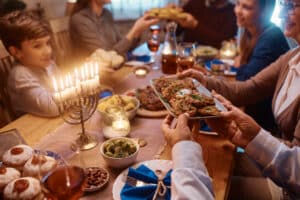
Judith’s cheese-filled pancakes eventually evolved. The cheesy pancakes were first recorded in Europe in the 14th century. In the late 18th and early 19th centuries , the potato was introduced to the region. The cheap, easily cultivated, and easily stored potato eventually replaced cheese as the foundational ingredient for fried pancakes.
The Jewish word for the dish, latke, translates simply as “pancake” and is related to the Old East Slavic word “оладья,” denoting a small and thick fritter. Both are likely also related to the ancient Greek word eladia meaning “little fried things.” referring to the oil that they are fried in.
As Eastern Europe and the Baltics especially endured constant invasions and hardships, particularly in the 20th century, the importance of the cheap, hardy potato grew. The spicing and cooking methods employed in the preparation of potato pancakes reflect the resourceful adaptations made by peasant communities in their harsh circumstances and their current form in Latvia and the Baltics can be seen as a harmonious fusion of Baltic, German, Swedish, Jewish, and Slavic culinary traditions.
The Latvians, this dish’s deep cultural connections are exemplified Latvian folklore band Iļģi, whose song which speaks of Latvia’s painful Soviet history and touches upon the spirit of resistance that emerged in the late 1970s all through discussion of potato pancakes.
Russian Vocabulary Associated With Драники
| Ingredients | Utensils & Appliances | Preparation |
|
Сковорода́ – frying pan Пе́чка – stove/oven Нож – knife Тёрка – grater Ложка – spoon Си́то – sieve, strainer |
Натереть – to grate Жарить – to fry Смешивать – to mix Золотой – golden Хрустящий – crispy |
How And When To Eat Potato Pancakes
Potato pancakes, whether served warm or cold, can be enjoyed informally as an affordable mid-week meal or as a delectable side dish. While they are best fresh, supermarkets in across Eastern and Central Europe carry mixes for whipping up a quick batch and also frozen, prefabricated potato pancakes that can be thawed, fried, and eaten.
All the aforementioned cultures that serve these pancakes will usually serve them with sour cream. In Russia, they are often served additionally with chives. Poland and Belarus will often top them with bacon and fried onions for a very hearty dish or add sweet applesauce to undercut the its salty starchiness and create a lighter, more balanced dish. In the Baltics, including in Latvian cuisine, which has been more influenced by Swedish culture, lingonberry sauce is preferred, enhancing the dish with its tart flavor. Likewise, the Baltics will sometimes boost the heartiness of this comfort dish with cream cheese and preserved fish.
For all cultures mentioned, potato pancakes are an everyday comfort food. For Ashkenazi Jews, however, they are also synonymous with Hanukkah, a holiday that commemorates the reclamation of the Jewish Temple from the Seleucid Empire. The rebellion was led by Judah Maccabee who, when rededicating the temple, added a day’s oil to the candelabra, but found that it miraculously burned for eight days. Fried potato pancakes have become the favorite item to fry in celebration.
Across Central and Eastern Europe, these pancakes become much more common during Lent as those that follow the religious observance switch to a vegetarian diet for the month and seek filling, meatless dishes.
How Do You Correctly Cook Potato Pancakes?
Use potatoes with high starch content to bind the pancakes together, such as russet potatoes. After you drain the excess liquid from the grated potatoes to ensure ultimate crispiness, drain the starch at the bottom of the liquid and add that back to the potatoes for maximum binding power. Whisking your eggs before adding them to the mixture will also ensure consistency and proper binding.
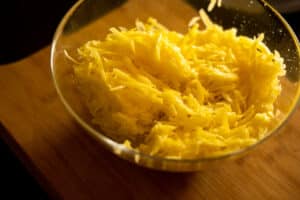
The different slots on your grater will produce very different potato pancakes. Smaller holes with more ridges will produce a crispier pancake (in line with Belorussian tastes) while the bigger slots will give you a softer pancake (in line with Latvian tastes). You can also experiment with various spices and oils to achieve different tastes. Many recipes recommend using olive oil for the richest taste.
To prevent the potatoes from turning gray, add lemon juice, vinegar, or vitamin C powder to the soak as you prepare the other ingredients.
Use a heavy-bottomed frying pan to distribute the heat more evenly. A cast iron skillet is best. You can also try cooking the pancake covered for the first minutes, which will allow it to cook through without burning as easily. Make sure to use medium heat and never high.
Thin pancakes are easier to cook through, but more likely to fall apart. Make sure to salt the potatoes and allow them to sit and drain as the salt helps to pull the moisture out. If the pancakes do fall apart, the dough has too much liquid. Add more flour and, next time, try squeezing more of the fluid out of the grated potatoes at the start.
These pancakes do not keep well (think cold French fries). Only fry as many as you can eat in a single serving.
Vegans can substitute the eggs for applesauce or with one part ground flaxseeds or chia seeds mixed with three parts water. If dieting, replace the potatoes with zucchini.
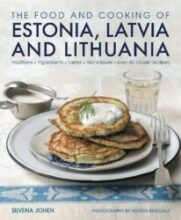 |
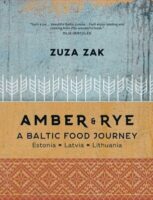 |
 |
 |
For more on Baltic cooking keep exploring this site or try some of the great resources above!
Let’s Cook!
Давай приготовим!
| Драники | Potato Pancakes |
| Подготовка: 30 минут
Приготовление: 20 минут Ингредиенты на 12 драников:
Дополнительные ингредиенты:
Инструкция:
|
Preparation: 30 minutes
Cooking: 20 minutes Ingredients for 12 pancakes:
Directions:
|
Our Favorite Potato Pancake Videos
Renowned Russian Chef Ivlev (шеф-повар Константин Ивлев) shares his detailed recipe for creating драники, guiding you through each step with valuable tips and insights. Join him as he demonstrates the entire process of preparing, cooking, and savoring драники. He speaks in clear Russian and English subtitles are avialble.
Jenny Can Cook gives you a grandmotherly look at a Polish version of pancakes, which prefers blended potatoes rather than grated and says that she guarantees that the pancakes will be crispy but not oily.
Latvian YouTuber and Chef Anete Germane presents an entertaining and engaging tutorial on creating kartupeļu pankūkas. With her unique comedic flair, she not only demonstrates the step-by-step process, but also dives into the fascinating history of kartupeļu pankūkas. Anete highlights the regional and temporal variations in its preparation, adding an intriguing dimension to the dish. Moreover, she emphasizes the importance of the potato in shaping Latvian identity
You’ll Also Love

Jewish Latvia: A Brief History and Guide
This guide offers advice to Jewish students considering study abroad programs in Latvia. Here, you’ll read about the local Jewish history, Latvia’s active synagogues, staying kosher, and about some of Riga’s major Jewish cultural organizations, museums, and memorials. Most importantly, we’ll get you on your way to engaging with the local Jewish community and comfortably […]
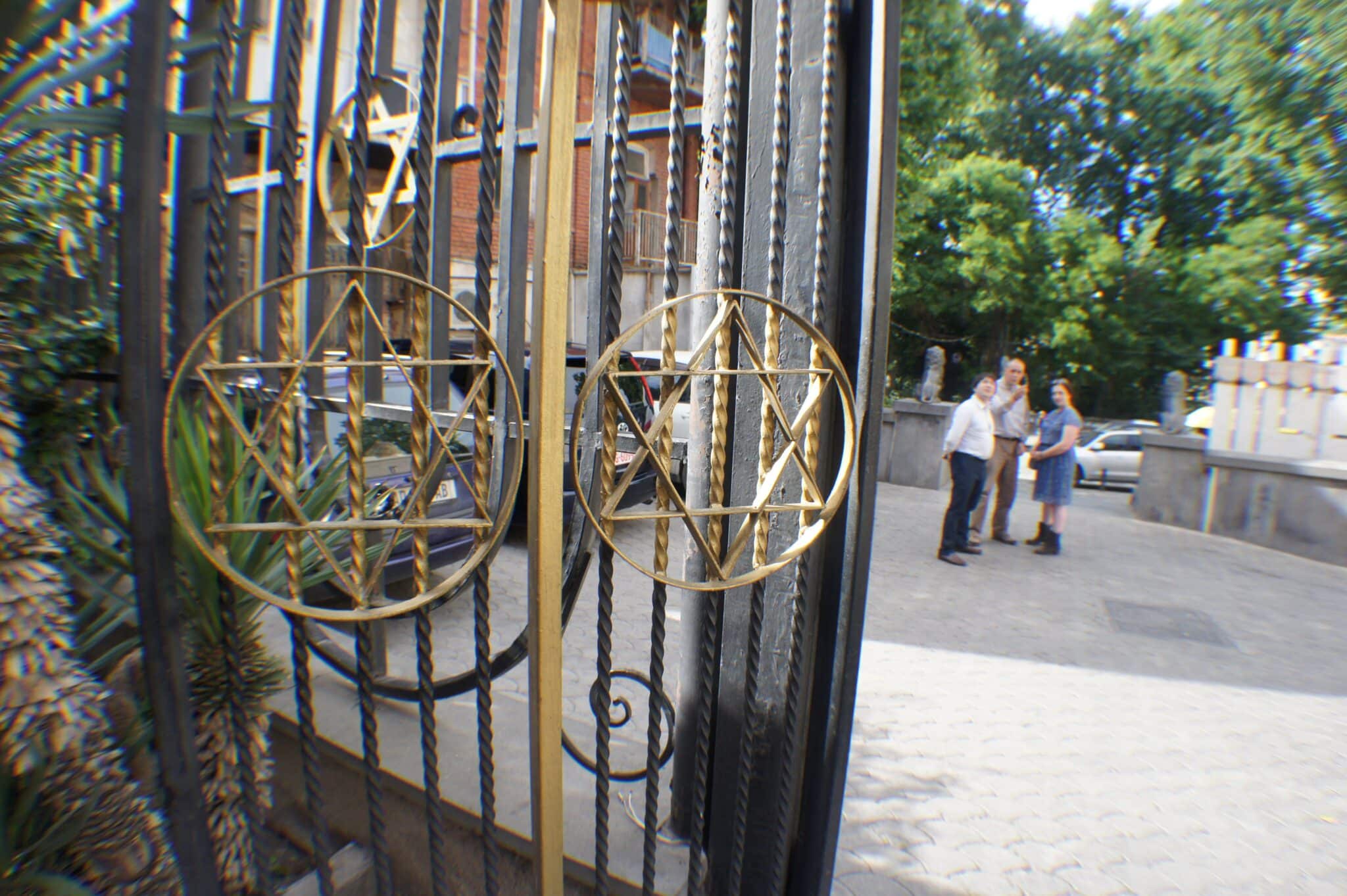
Jewish Georgia: A Brief History and Guide
This guide to travel in Georgia is tailored for Jewish-American university students preparing to study abroad in Georgia. We navigate the historical depth and modern vibrancy of Jewish life in this culturally rich country. Discover key historical sites, engage with local Jewish communities, and find practical tips on maintaining kosher practices and observing Shabbat while […]

Jewish Warsaw: A Brief History and Guide
This guide to travel in Poland is tailored for Jewish-American university students preparing to study abroad in Warsaw. Learn about Poland’s long Jewish history and find out where to find a kosher meal while abroad. We’ll also cover some major museums, historical sites, and day trips. Most importantly, we’ll get you moving on engaging with […]
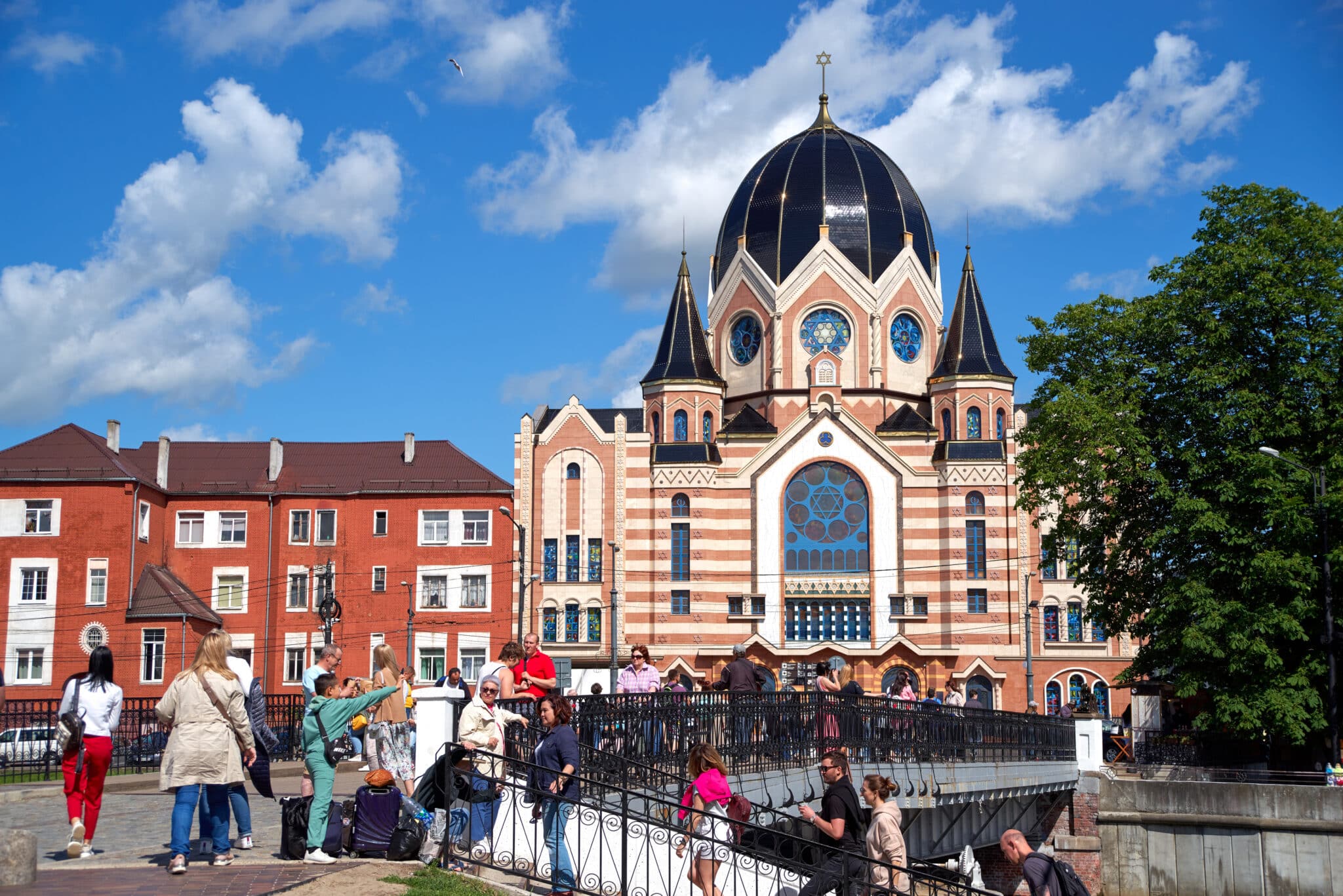
Judaism in Russia: Моя Россия Blog
In this text, Tajik blogger Roxana Burkhanova describes, in Russian, the history of Jews in the Russian Empire, the USSR, and the Russian Federation. While the resource focuses on Russia, this also includes Jews in regions which are no longer part of Russia – including Central Asia, the Caucasus, and Central and Eastern Europe. More […]
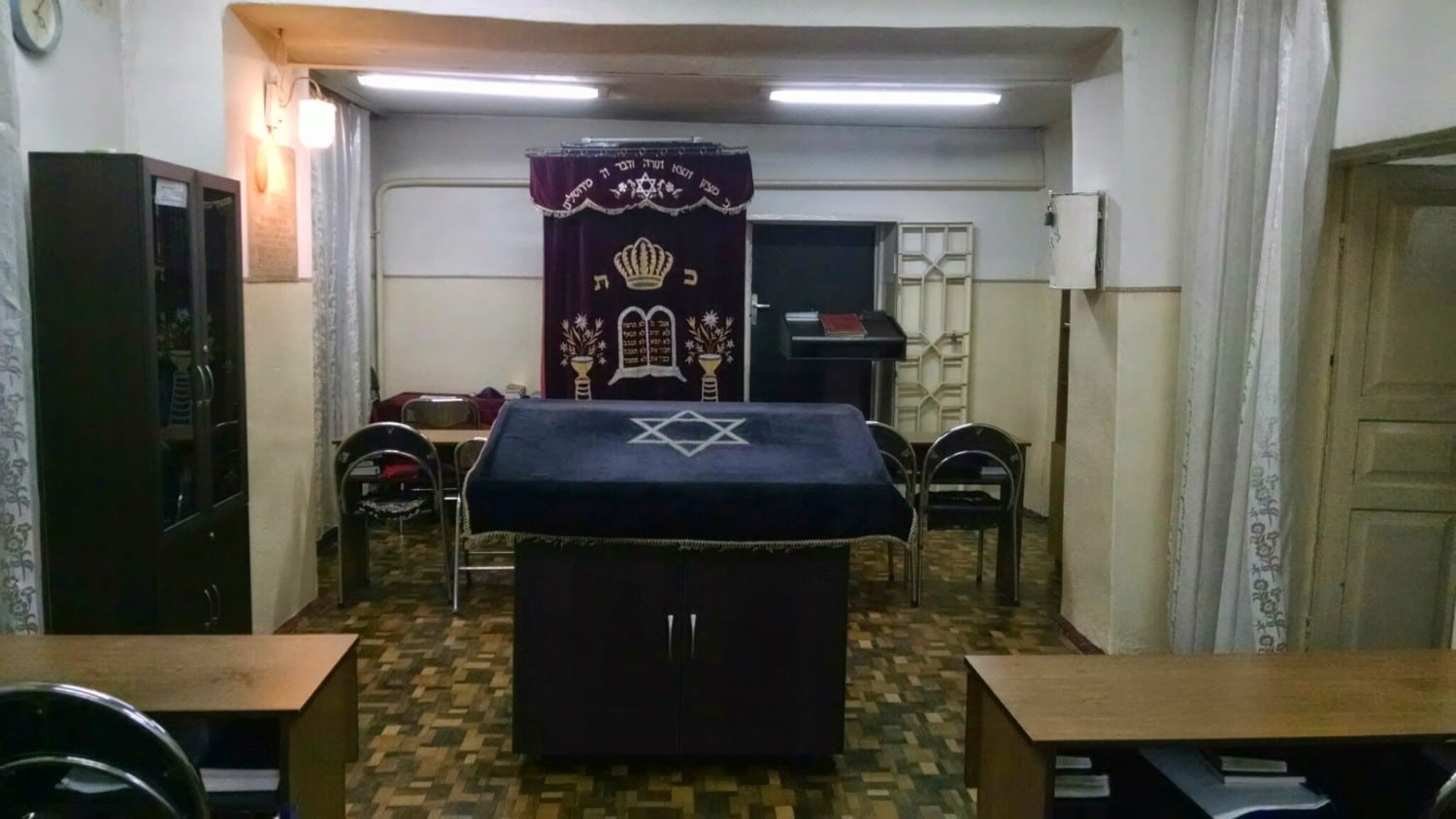
Jewish Bishkek: A Brief History and Guide
Though the concrete details of Jewish presence in the area of Kyrgyzstan itself is largely unknown before the Soviet Union, Bukharian Jews have resided there since the 4th century. In the modern day, the population of Jews in Kyrgyzstan is estimated to be approximately 500 with most located in Bishkek. For visitors and locals alike, […]

